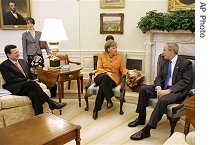2007年VOA标准英语-US - EU Leaders Discuss Missile Defense, Enviro(在线收听)
White House
30 April 2007
The latest United States-European Union summit has ended with signs of progress on several issues that have strained trans-Atlantic ties, including alternative energy and pushing ahead on world trade talks. VOA's Paula Wolfson reports from the White House, where President Bush held talks with European Commission President Jose Manuel Barroso, and German Chancellor Angela Merkel, who currently holds the revolving EU presidency.
 |
| U.S. President Bush (r) meets with German Chancellor Angela Merkel (center) and European Commission President Jose Manuel Barroso in the Oval Office of the White House in Washington, 30 Apr 2007 |
The three leaders stressed their desire to see the stalled world trade talks succeed. EU Commission President Barroso said the level of agreement on energy and the environment exceeded his expectations.
"To be very frank, it was better than I was planning," said Jose Manuel Barroso. "I think it was real progress."
They agreed on the need to limit the emissions that scientists say contribute to global warming, to promote the use of renewable fuels, and to encourage cooperation on these matters. Mr. Bush made clear he remains opposed to the kind of mandatory emission controls contained in the global treaty known as the Kyoto Protocol, which the United States has refused to sign.
But on both sides there was recognition of the extent of the problem, and the need for industrialized countries to take action, and convince developing nations to follow suit.
Chancellor Merkel vowed to make the issue a priority when she hosts the Group of Eight Summit in June.
"We, as industrialized countries, need to address this issue, need to develop necessary technology," said Angela Merkel. "But, we alone, without the emerging countries, will not be able to solve this problem."
These annual U.S.-EU meetings are technically a venue for economic discussions. But, over the years, security issues have increasingly risen on the agenda.
One matter of high concern to the trans-Atlantic alliance is Russia's reaction to an American proposal to build a missile-defense shield that would put radar and interceptors in Poland and the Czech Republic, both of which were once part of the Soviet military alliance.
Russian President Vladimir Putin has threatened to retaliate by pulling out of a treaty that sets limits on the deployment of military forces in Europe.
President Bush told reporters at a joint news conference after his talks with the EU delegation, that he is taking some advice on the matter from Chancellor Merkel, with whom he consults regularly.
"She expressed her concerns that the U.S. position was not very clear about the missile defense systems, and that there were some people concerned in Germany, as well as [in] Europe, about our intentions," said President Bush. "And, she also suggested it might make sense for me to share our intentions more clearly with President Putin."
Mr. Bush said that is why he asked Secretary of Defense Robert Gates to go to Russia last week.
"I called President Putin, and asked him to see Secretary Gates, and [said] that we would put forward an interesting information-sharing proposal," he said. "Our intention is to say to Russia that, 'the system is something you ought to think about participating in.'"
President Bush is expected to highlight the missile defense program when he goes to Europe in June. Before and after the G-8 Summit in Germany, he will visit the Czech Republic and Poland, as well as Albania and Bulgaria.